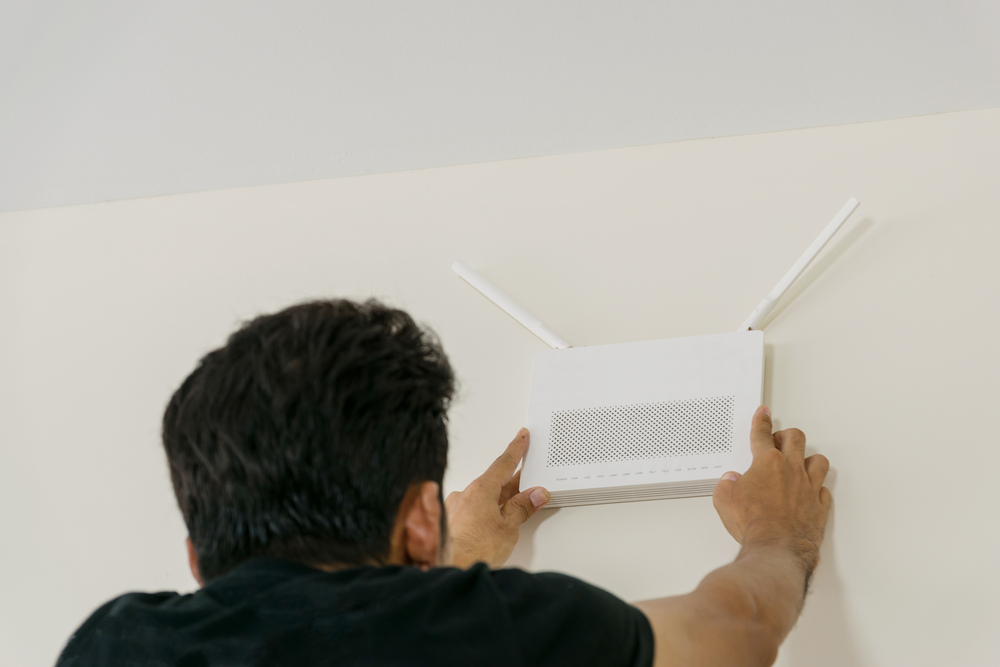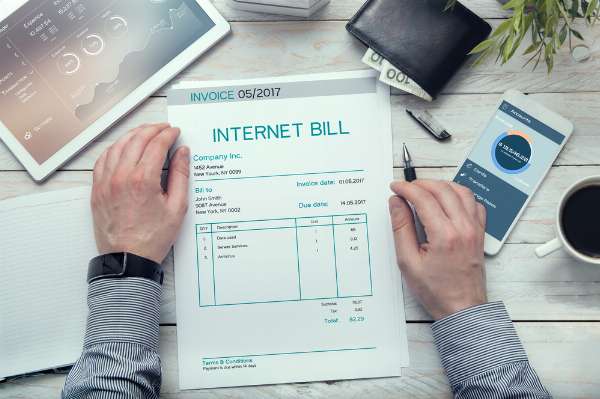The internet is an integral part of our lives; we turn to social media to connect with people and real-life events, and we stream the latest movies, shows, and games on our devices. Even our appliances are connected to Wi-Fi. With all of these factors, it’s easy for an internet bill to skyrocket. Depending on your connection type, you may be paying an average of $64 per month. Luckily, it’s easy to lower your internet bill with these money-saving hacks. Here are some tips for slashing your internet bill that your internet service provider (ISP) doesn’t want you to know!
Find and Catalog those Hidden Fees
When you sign up for internet service, your internet service provider gives you a price that’s far lower than what’s on the bill. After a year, you’ll usually see that price go up, whether from hidden fees or the promotional rate ending. Hidden fees may include activation fees, equipment rentals, or overdue payments. Hidden fees vary by ISP, but it’s rare for one not to have any.
So take a look at that bill of yours! Don’t just find out that you have hidden fees — find out which surprise fees you have and figure out why they’re there. Ask your ISP what you can do to get rid of them, if anything. Sometimes, just asking (politely, of course) will inspire a customer service rep to help you get rid of them. Other times, there may be simple fixes you didn’t know about (we’ll mention a few of them in this article)!
Supply Your Own Modem and Your Own Router
One common hidden or unexpected internet fee is the charge you’ll see for renting your router and modem. But this fee is optional!
The typical MO for those sneak ISPs: Show up with a router and modem, charge a one-time installation fee, and then charge another recurring fee every month for the “privilege” of using their router. If you call your internet provider to activate the service, that’s another charge on the bill. Even having the equipment removed could cost extra!
Thankfully, it’s easy to obtain and install a router without your provider’s help. Retailers like Target, Best Buy, and Staples all offer affordable routers. You basically only have two things to worry about when choosing a router: whether it works with your particular ISP, and whether it’s fast enough for your internet speed. Both of these things are pretty easy to figure out, especially if you get some help from a sales rep at an electronics store. Your ISP may also have a list of compatible or recommended modems on its website.
Troubleshoot Your Own Internet Problems

Problems will inevitably arise, whether you use the provider’s equipment or your own. While your first instinct may be to call for a repair, it’s possible you can fix the issue yourself. Many technical issues, like a weak signal, can be solved with a reset. Online guides for more complex problems can be found through a simple web search.
Not every issue can be solved without an expert’s help. In these scenarios, you may still want to avoid calling your internet provider. Non-ISP specialists like Geek Squad may offer cheaper assistance than your provider. Before calling anyone, compare prices and find the nearest store location. Some groups charge for distance traveled, so take that into account.
Consider a Bundled Plan — Or Ditch Yours for an Internet-Only Plan
If you pay for TV service, you may be able to save big with a cable provider’s bundled internet and TV deals. The same goes for home phone service and, in many cases, mobile service or home security service. If you’re paying separately for services like these, combining them could be a quick and easy way to save.
Of course, bundling like this may sound like a sweet deal — but it’s only worth it if you really treasure and make use of these extra services. Think about it carefully. Do you really watch much TV? Do you really use all of those channels? Do you like using this company as your mobile provider? Is the security system you have important to you, or would you still be worry-free with something a little less extensive?
Depending on your personality, situation, and needs, you may find that a bundle includes upsold services that you simply don’t need. Internet-only plans might not offer the same value as bundles, but they’re ultimately cheaper. If internet is all you need, consider paying slightly more for it in exchange for not having to pay at all for those other, less useful things.
Only Pay for the Speed You Need
Modern internet users thrive on instant gratification — we want things fast. As frustrating as it can be to watch a video buffer, it’s probably cheaper than loading it all at once. We aren’t suggesting that you return to the age of dial-up (slow and steady may win the race, but there’s such a thing as too slow)! Depending on your internet usage, you may not need the fastest download speeds. Again, this is relative to your personal habits. You’ll need the best download speeds available if you’re an avid gamer, for example. But someone who only watches the occasional Netflix special and browses the web could save money by choosing a plan with lower speeds.
Monitor Your Data Usage
Similar to speeds, unlimited data might be unnecessary. Most major ISPs don’t have data caps on their plans, but some still do. If you aren’t constantly online and/or stick to low-data websites and apps, you’re better off purchasing a cheaper plan with a data cap. Keep in mind that if you exceed your data usage for the month, that may lead to data overage fees. Most ISPs offer a way to track data usage, though.
Even if you do use a lot of data, there are ways to avoid reaching your data cap. Lowering the quality of streaming services such as Spotify and Netflix can drastically reduce the number of gigabytes used per hour. The same goes for YouTube, Twitch, and TikTok. Some companies also feature “data bonus zones,” or specific times when data usage isn’t counted. These frequently occur during off-peak hours, such as the middle of the night — perfect for some late-night bingeing. Try to track your data usage, then see if you can find a more affordable plan.
Use Public Wi-Fi
Free public Wi-Fi is a wonderful thing, and you can find it in coffee shops, libraries, and all sorts of other places. Now, we wouldn’t necessarily recommend that you use public Wi-Fi instead of having a home internet plan (you would certainly save big if you did that, but it wouldn’t be very convenient). But we would suggest using public Wi-Fi when possible to avoid racking up data against your cap.
By connecting to free Wi-Fi at places like coffee shops, libraries, or public parks, you can surf the web, stream videos, or update your apps without using any of the data from your home internet plan. You’ll avoid overage fees and may even be able to opt for a cheaper internet package with lower data limits, as you’ll be offloading much of your data usage to these free networks. Just remember to be cautious about security when using public Wi-Fi — avoid accessing sensitive information like bank accounts or personal details unless you’re on a secure connection.
This advice also might apply at your office. If you’re on your way out of the office and see that someone has texted you a viral video, remember: You can watch that video now or when you get home, but only one of those two options will count toward your home internet data cap!
Apply for Financial Support
Almost every major ISP offers some form of financial support. These can range from discounts for veterans or those with disabilities to affordable plans for low-income households. Plans for seniors and students are also usually available. You can find many forms of financial support available, depending on eligibility requirements.
Many schools offer free or reduced-cost internet for students and their families as well. This practice took off at the start of the pandemic. While some have retired the policy as in-school learning has resumed, some schools still offer it. Check with your local government, school district, or college to see if low-cost or free internet service is available in your area.
Negotiate With Your ISP

Above all else, ISPs want two things: profit and your business. This means that the consumer has some sway over the company, rather than the other way around. So don’t be afraid to negotiate! If you were guaranteed a certain rate, mention it. Did an add-on you never requested appear on your bill? Dispute it. More often than not, your ISP will acquiesce and offer you a better price. Remember to be polite yet firm.
For more serious negotiations, you may want to hire a third party. These professionals will make your case for you to the internet provider while also proving how serious you are. After all, you wouldn’t hire someone over a simple matter! Even just the threat of bringing in a third-party negotiator may be enough to smooth things out.
But the biggest threat any person can make is threatening to leave. Again, all an ISP wants is your business; your dollar speaks louder than words. Don’t follow through with the threat unless your ISP absolutely refuses to budge. Most providers have an early-termination fee if you sign a contract, so even if you walk, they’ll still get your money in the end.
Switch Providers
We mentioned that you might want to hint at leaving your current provider when you negotiate with them. That doesn’t necessarily have to be an empty threat! Depending on what internet providers are available in your area, you may actually want to switch to a cheaper option.
Switching is often cheap, because providers love to entice us with new-customer rates. With a little negotiation, you might even be able to get these rates as a returning customer who has spent a little time away. Why not come “home” prodigal-son style to your old provider and let them shower you with low rates? You might even be able to turn around and do the same thing in reverse a few years later.
Check out our homepage’s ZIP Check to see internet plans in your area, and consider switching to a cheaper plan or provider to save money.



